Please find our most recent market review below. We hope these perspectives are valuable to you.
– The AdvicePeriod Team
Tech Resumes Its Dominance
Technology stocks, notably Nvidia, drove the market higher in May
Key Observations
- The S&P 500 rebounded from a weak April, gaining nearly 5%.
- Small-cap stocks performed in line with large caps, but mid-caps lagged.
- Bonds also bounced back, returning 1.7% for the month.
- International developed markets lagged the U.S., adding only 3.9%.

The U.S. stock market bounced back strongly from a weak April, adding nearly 5% in May. The S&P 500 is now up 11.3% in 2024. Technology stocks led the way, gaining over 8% for the month, and have advanced over 17% for the year. Small-cap stocks experienced a strong rebound, jumping 5%, while mid-caps were weaker, edging up only 2.9%. Non-U.S. developed equities lagged the U.S., returning under 4%, while emerging market stocks added only 0.5%. The Bloomberg U.S. Aggregate Bond Index also rebounded from a weak April, rising 1.7% for the month, while the 10-year Treasury yield fell from 4.59% at the start of the month to 4.50% at month-end. Yields on the 2-year Treasury marginally dropped in April, starting at 4.94% and falling to 4.88%.
Sell in May and Go Away? Not So Fast
May is supposed to be the month in which investors sell off and leave the market until October, when things start picking up again, historically speaking. May 2024 certainly was another persuasive data point for abandoning this strategy as the markets rallied after a poor April. The first two weeks of the month were notably strong, lifted by less-hawkish-than-predicted commentary from the Federal Reserve and some initial signs that the labor market may be cooling. Coming into May, there were concerns about lingering inflation, which largely led to the poor market performance in April. Early in May, nonfarm payrolls were released for April, showing growth of only 175,000 jobs for the month, significantly below the estimate of 240,000. The market reacted positively to this news because a cooler labor market in theory should lead to subdued price increases.
The Consumer Price Index rose 3.4% in April, slower than March and generally in line with expectations. Core prices increased at the slowest year-over-year rate since early 2021, an encouraging sign. However, in the latter half of the month, many Fed officials reiterated they would wait for more evidence of easing inflation before cutting rates, with Cleveland Fed President Loretta Mester saying, “In my view, the most likely scenario for the overall economy and that of the region is that the current restrictive stance of monetary policy will continue to help moderate growth and labor market conditions and that this moderation will contribute to the further easing of price pressures.” Additionally, consumer sentiment decreased 8.1 points from April and is now at a six-month low of 69.1.
While a cooling labor market and signs of a more dovish Fed helped the markets rally at the beginning of the month, strong earnings from Nvidia in the latter half of the month was what likely held up the market’s early gains. Nvidia reported earnings of $26 billion in the fiscal first quarter, exceeding analysts’ expectations of $24.7 billion. Nvidia’s artificial intelligence (AI) accelerators, which are chips that data centers utilize for chatbots and other efficiency-enhancing tools, have been the primary driver of exponential sales growth.
One year ago, when Nvidia announced its first-quarter earnings, it was received by the market as validation of the buzz over AI and was the impetus for the major rally that led to the market’s performance in 2023. As seen in the chart below, Nvidia’s share price has been indicative of the S&P 500’s price-to-earnings ratio over the past 12 months. Of course, this can’t be expected to continue forever and shows the exuberance of the market over the AI trend.
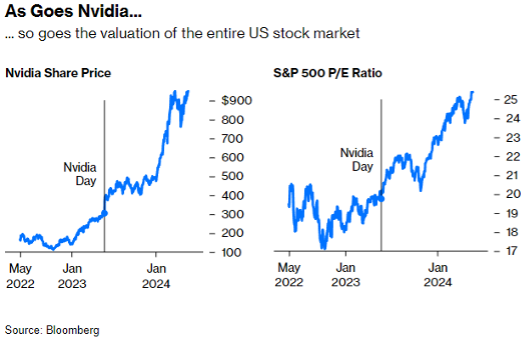
Disclosures:
This market commentary is meant for informational and educational purposes only and does not consider any individual personal considerations. As such, the information contained herein is not intended to be personal investment advice or recommendation. References to specific asset classes and securities are for illustrative purposes only and are not intended to be, and should not be interpreted as, recommendations to purchase or sell any securities or assets classes.
The commentary represents an assessment of the market environment through May 2024. The views and opinions expressed may change based on the market or other conditions. The forward-looking statements are based on certain assumptions, but there can be no assurance that forward-looking statements will materialize. This commentary was written and provided by an unaffiliated third party; we cannot guarantee the accuracy or completeness of any statements or data contained herein.
Indexes are unmanaged and cannot be directly invested into. Past performance is no indication of future results. Investing involves risk and the potential to lose principal.
AdvicePeriod is another business name and brand utilized by both Mariner, LLC and Mariner Platform Solutions, LLC, each of which is an SEC registered investment adviser. Registration of an investment adviser does not imply a certain level of skill or training. Each firm is in compliance with the current notice filing requirements imposed upon SEC registered investment advisers by those states in which each firm maintains clients. Each firm may only transact business in those states in which it is notice filed or qualifies for an exemption or exclusion from notice filing requirements. Any subsequent, direct communication by an advisor with a prospective client shall be conducted by a representative that is either registered or qualifies for an exemption or exclusion from registration in the state where the prospective client resides. For additional information about Mariner, LLC or Mariner Platform Solutions, LLC, including fees and services, please contact us utilizing the contact information provided herein or refer to the Investment Adviser Public Disclosure website (www.adviserinfo.sec.gov). Please read the disclosure statement carefully before you invest or send money.
For additional information as to which entity your adviser is registered as an investment adviser representative, please refer to the Investment Adviser Public Disclosure website (www.adviserinfo.sec.gov) or the Form ADV 2B provided to you. Investment adviser representatives of Mariner, LLC dba Mariner Wealth Advisors and dba AdvicePeriod are generally employed by Mariner Wealth Advisors, LLC. Investment adviser representatives of Mariner Platform Solutions, LLC dba AdvicePeriod, are independent contractors.
Index Definitions: The S&P 500 is a capitalization-weighted index designed to measure the performance of the broad domestic economy through changes in the aggregate market value of 500 stocks representing all major industries. Russell 2000 consists of the 2,000 smallest U.S. companies in the Russell 3000 index. MSCI EAFE is an equity index which captures large and mid-cap representation across Developed Markets countries around the world, excluding the U.S. and Canada. The index covers approximately 85% of the free float-adjusted market capitalization in each country. MSCI Emerging Markets captures large and mid-cap representation across Emerging Markets countries. The index covers approximately 85% of the free-float adjusted market capitalization in each country. Bloomberg U.S. Aggregate Index covers the U.S. investment grade fixed rate bond market, with index components for government and corporate securities, mortgage pass-through securities, and asset-backed securities. Bloomberg U.S. Corporate High Yield Index covers the universe of fixed rate, non-investment grade debt. Eurobonds and debt issues from countries designated as emerging markets (sovereign rating of Baa1/BBB+/BBB+ and below using the middle of Moody’s, S&P, and Fitch) are excluded, but Canadian and global bonds (SEC registered) of issuers in non-EMG countries are included. FTSE NAREIT Equity REITs Index contains all Equity REITs not designed as Timber REITs or Infrastructure REITs. Bloomberg Commodity Index is calculated on an excess return basis and reflects commodity futures price movements. The index rebalances annually weighted 2/3 by trading volume, and 1/3 by world production and weight-caps are applied at the commodity, sector, and group level for diversification.
Does past performance matter?
Major Market Index Returns
Period Ending 6/1/2024
Multi-year returns are annualized.

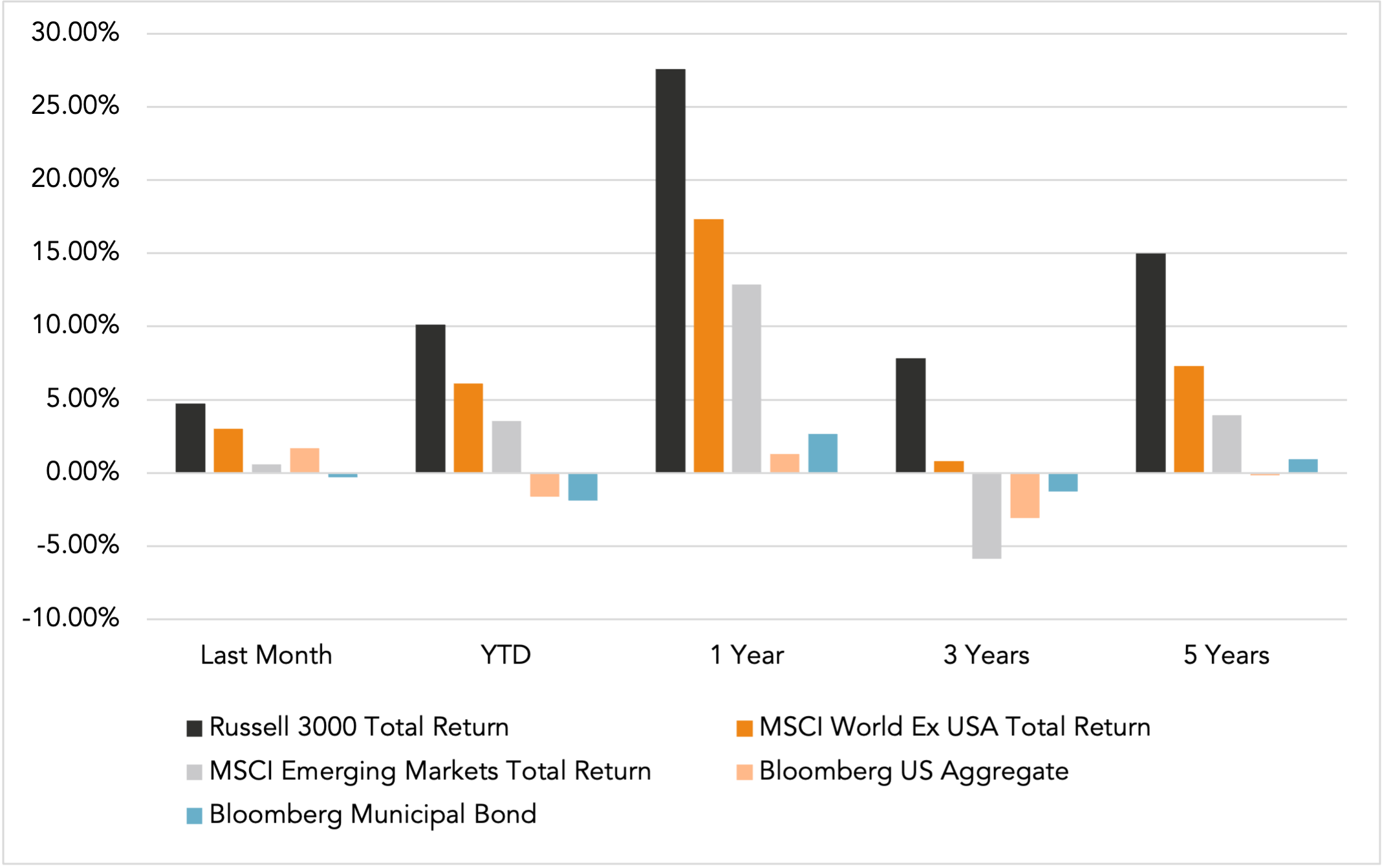
Mix Index Returns
Global Equity / US Taxable Bonds

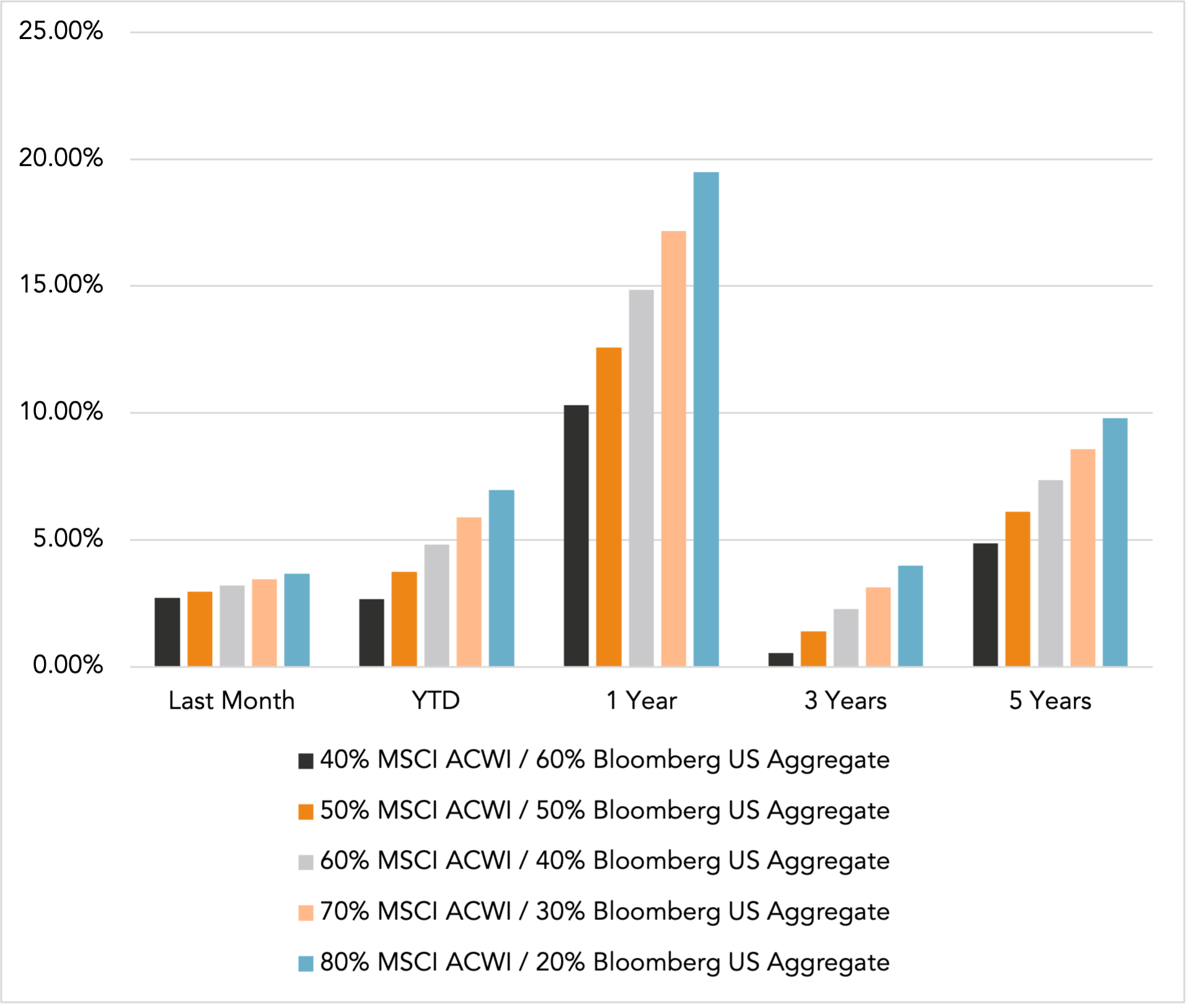
Indexes are unmanaged and cannot be directly invested into. Past performance is no indication of future results. Investing involves risk and the potential to lose principal.
The Russell 3000 Index is a United States market index that tracks the 3000 largest companies. MSCI Emerging Markets Index is a broad market cap-weighted Index showing the performance of equities across 23 emerging market countries defined as emerging markets by MSCI. MSCI ACWI ex-U.S. Index is a free-float adjusted market capitalization-weighted index that is designed to measure the equity market performance of developed and emerging markets excluding companies based in the United States. Bloomberg U.S. Aggregate Bond Index represents the investment-grade, U.S. dollar-denominated, fixed-rate taxable bond market, including Treasuries, government-related and corporate securities, as well as mortgage and asset-backed securities. Bloomberg Municipal Index is the US Municipal Index that covers the US dollar-denominated long-term tax-exempt bond market. The index has four main sectors: state and local general obligation bonds, revenue bonds, insured bonds, and prerefunded bonds.

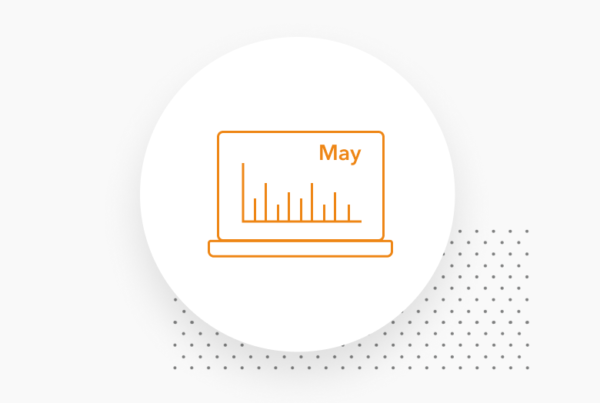
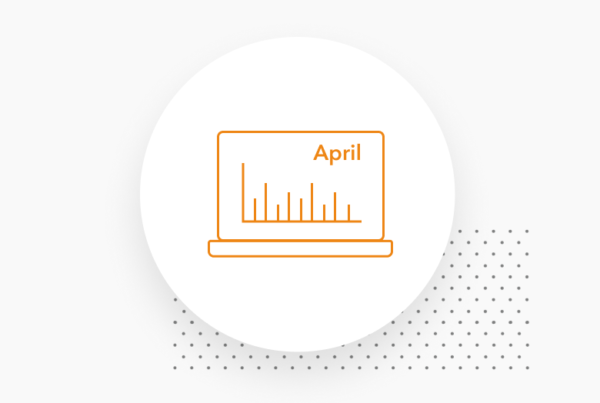

Market Update: May 2025 In Review